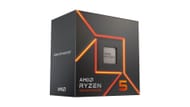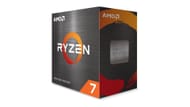The AMD Ryzen 7 5700X was launched as a low-power octa-core offering in the Zen 3-powered lineup. Following the launch of the newer Ryzen 7000 series of chips, the 5700X has been handsomely discounted on all major online stores, making it a solid option over the newer Ryzen 5 7600X. Gamers get two extra cores, a lower power draw (105W vs. 65W), and support for cheaper motherboards and RAM. However, one needs to look at the performance difference between these chips before finalizing any of them.
AMD has achieved massive gains in single-core performance in this generation, thanks to the improved and redesigned Zen 4 architecture. Other changes include shifting to an LGA socket, which offers better user-friendliness as compared to the older PGA layout, and support for DDR5 memory, which also improves gaming performance slightly.
Both chips have their own pros and cons. This can make choosing between them pretty difficult. Thus, in this article, we will pitch the Team Red offerings against each other and try to find out which is better among them.
Both Ryzen 7 5700X and Ryzen 5 7600X are solid performers in video games

Before diving into the exact performance metrics, let's check out the on-paper specifications of the AMD chips and find out what they bring to the table.
Right off the bat, the biggest difference between the 5700X and the 7600X is the difference in core counts. The 5700X packs eight cores and 16 threads under its hood. Although the 7600X comes with two fewer cores and four fewer threads, each core is now faster thanks to the Zen 4's IPC improvements.
All Ryzen 7000 processors religiously boost over 5 GHz, including the budget Ryzen 5 7600 non-X. In contrast, the Ryzen 7 5700X tops out at 4.6 GHz. Starting this generation, marques with an 'X' draw over 65 W power. In our testing, we found the 7600X drawing over 115W while delivering peak performance (it's rated at 105W).
Performance differences

Each core of the newer Ryzen 5 7600X is faster than that of the Ryzen 7 5700X. In synthetic tests like Cinebench R23 and Geekbench 5, we found that the difference is over 25%.
Most video games don't utilize more than two to three cores. Thus, the higher core count of the 5700X won't impact performance in video games in any way. However, the higher single-core performance of the six-core chip should allow for higher performance in the latest AAA titles.
The higher core count of the Ryzen 7 5700X helps the processor almost level the newer 7600X in multi-core workloads. However, the Ryzen 5 7600X still maintains a slight lead in both Cinebench R23 and Geekbench 5.
In video games, however, the performance difference isn't as high as observed in the synthetic benchmarks and the numbers vary from title to title. All of these benchmarks were recorded at 1080p with the graphics set to Medium to ensure the game is CPU-bound.
The performance isn't wildly apart, as evident from the above chart. You can still get away with the Ryzen 7 5700X today as it will be much cheaper than a system based on the 7600X.
However, if you don't have cash constraints, the six-core Ryzen 5 7600X is a much better option in terms of upgradability, future-proofing, and performance. You can replace it with a Ryzen 5 9600X sometime down the line, an option not available on the 5700X.
